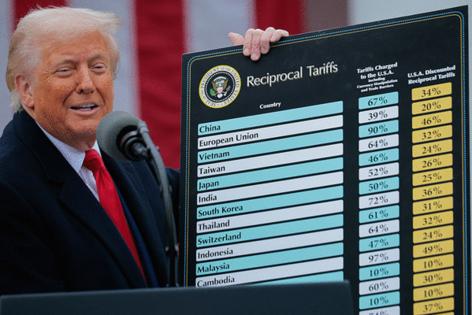Appeals court hears tariff challenge
Published in News & Features
WASHINGTON — The Trump administration defended its broad tariff regime Thursday to a panel of sharply skeptical federal judges who repeatedly questioned whether Congress gave the president such broad tariff powers.
The 11-judge panel of the U.S. Court of Appeals for the Federal Circuit grilled the Justice Department attorney and challengers over the legality of the tariffs, which have been a signature domestic and foreign policy strategy in the second Trump administration. A lower court found the tariffs, which Trump used a four-decade old statute to impose for the first time, violate the law.
During oral arguments Thursday, Judge Raymond T. Chen questioned whether Trump’s broad argument about his emergency power “would sound the death knell of the Constitution” by allowing him to rewrite tariff law. Chen said that it didn’t appear the administration could rely on a court case known as Yoshida upholding limited Nixon-era tariffs to justify the current broad ones.
“It seems pretty clear to me Yoshida is telling us that no, the president doesn’t have the authority to rewrite the tariff schedule and in this case it seems that’s what the president is trying to do,” Chen said.
At another point, Judge Jimmie V. Reyna pointed out that the law Trump invoked — the International Emergency Economic Powers Act of 1977 — never mentioned tariffs and there is an existing set of laws that set out certain procedures to set specific tariffs that involve fact-finding procedures and public comment.
If Trump could just invoke a national emergency to set his own tariffs, “why would the president use statutes on the books that give explicit tariff powers?” Reyna asked.
Brett Shumate, the DOJ attorney, argued that just because other laws give the president the power to impose tariffs doesn’t mean that Congress would not provide a broader power in an emergency. Shumate argued the law gives the president the power to “regulate” trade, which should include the power to raise tariffs.
Shumate argued that the courts do not have the power to review Trump’s declaration of a national emergency. If there are any abuses, Shumate said it is on Congress to rein in the president through joint resolutions to cancel the national emergency.
“There is a role for the court to play, but the primary role is for Congress to play if there was an abuse of tariff authority,” Shumate said.
Thursday’s hearing comes from cases brought by businesses and a coalition of states that argued Trump exceeded his authority by trying to impose tariffs using the 1977 law.
Although the lower court in the case, a three-judge panel of the Court of International Trade, found the tariffs unlawful, the federal circuit has paused that ruling while it considers the case.
The lower-court ruling covered certain tariffs on Canada, Mexico and China and the minimum 10% worldwide tariffs as well as higher country-specific tariffs scheduled for the summer. A ruling either way is likely headed for the Supreme Court.
Neal Katyal, attorney for the companies challenging the tariffs, pointed out that Congress never gave the president the explicit authority to raise tariffs under the law Trump invoked. Allowing Trump to stretch an emergency statute like that is a “breathtaking claim to power that no president has asserted in 200 years, and the consequences are staggering,” he said.
“The whole idea is that tariffs and taxation are always tempting for kings and presidents,” Katyal said, “and that is why the power was given to Congress.”
Benjamin Gutman, arguing on behalf of the state coalition, said Congress gave specific authority to the president under the statute, including major powers like shutting down trade entirely, but did not explicitly allow the president to raise tariffs on trillions of dollars in international trade.
“The power to raise revenue is a power reserved to Congress; it is a power that was particularly reserved to Congress,” Gutman said.
The oral arguments come the day before Trump’s self-imposed Aug. 1 deadline for many countries to arrive at trade agreements meant to forestall tariffs under many of the tariffs Trump imposed using the 1977 law.
Members of Congress have also increasingly pushed for legislation to rein in the president’s trade powers. Congressional Democrats — 191 in total — filed a brief in the tariff case argued Thursday saying that Trump’s tariffs violated the law and subverted the Constitution.
The law Trump invoked “provides the President with defined powers to address national emergencies, but does not confer the power to impose or remove tariffs,” the brief said.
On Wednesday, Senate Democrats also sought unanimous consent to pass two bills to rein in Trump’s tariff powers, but Sen. Michael D. Crapo, R-Idaho, objected to both. The first would explicitly strip tariff-setting power from the law Trump invoked, the International Emergency Economic Powers Act. Sen. Peter Welch, D-Vt., said the second would carve out small businesses from tariffs imposed under the law.
In the House, Republicans voted through in March a procedural change that would prevent a floor vote on overriding the national emergency used to justify the tariffs. Democrats have tried to lift that block in the House Rules Committee, including in a measure that failed in May.
Some Republicans in the chamber, including retiring Rep. Don Bacon, R-Neb., have said Congress should address the president’s claimed tariff powers, but no legislation has advanced in the chamber.
The cases argued Thursday are separate from a case brought by California, which was dismissed earlier this year.
The combined cases are State of Oregon et al. v. the Department of Homeland Security et al., and V.O.S. Selections et al. v. United States et al.
_____
©2025 CQ-Roll Call, Inc., All Rights Reserved. Visit cqrollcall.com. Distributed by Tribune Content Agency, LLC.







Comments